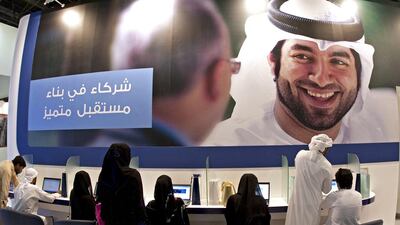I grew up listening to the language of my mother and father. My older sisters chipped in over the years, and then later at primary and high school, I gradually developed the accuracy and fluency of my language through many hours of formal grammar, spelling, reading and writing.
When I left school, I studied at a university using my native English language as the medium of instruction and learning. Five years later, I graduated master of arts. Everyone I knew at primary school followed a similar path, though many did not go on to graduate from university, but instead worked hard in their jobs to enable them to eventually marry and have a family.
Looking back, there appeared to be opportunities everywhere, for everyone.
In 1995, I arrived in Dubai with my wife and young family, and was employed as a teacher in a federal post-secondary system of colleges. I remember well my first lesson with young adult male Emiratis. They were shy, respectful, nervous, all smartly dressed in their sparkling white kanduras with ghutras and agals perfectly positioned on their heads. They seemed pretty interested in me but not so much in learning, and I found it difficult comparing them to teenagers back home.
After about three weeks, the realisation hit me like a sledgehammer: these young students from an Arabic-speaking country were attending a university where the medium of instruction was English. They were expected to use English despite the fact they had had very limited formal exposure to English at school. The problem was their English was just about as good as my schoolboy French when I first started university.
And so I asked myself, how well would I have coped if I had faced the prospect of learning history, economics and geography in my first year at university using my rudimentary French? Not very well, I guessed.
Fast forward to 2016. Having spent two decades in the region, I have become much more aware of the issues around Emiratisation. When I first started working back home in my twenties, I joined a school as a teacher where everyone spoke the same language and came from the same culture. Apart from a few weeks of social stiffness, I eventually felt a sense of belonging, fitting in quite seamlessly.
However, feedback from both private sector managers and Emiratis highlights real difficulties in communication and managing expectations. Managers report that new Emirati recruits lack many of the soft skills required to be successful in a job while Emiratis complain of bullying tactics, inflexibility and a lack of support and respect for their culture.
Many Emiratis feel like strangers living in today’s world faced with limited options and opportunities for self-fulfilment.
The two sides appear to be totally at odds with one another, resulting from (and in) a messy misalignment of the needs of employers, the economic requirements of the national economy and the expectations of young nationals.
It is little wonder then that after more than a decade of Emiratisation effort and focus, only a tiny fraction of the private sector is comprised of Emiratis, most of whom continue to be lured into the public sector by high salaries, excellent benefits and the absence of cultural barriers and problems associated with an expatriate workforce.
Throw in the drop in oil revenue that has placed pressure on public expenditure and you have a “perfect storm” of contributory factors that require urgent and timely resolution.
Gratuitous and self-congratulatory initiatives and projects, and media-grabbing headlines, do little to solve the systemic issues and to face squarely the harsh realities confronting the nation.
Strong, potentially radical, steps are required to change the country in a new direction, towards a new and exciting future. The experience of “strangeness” in your own country can never be acceptable.
Dr Peter J Hatherley-Greene is director of learning at Emarise

